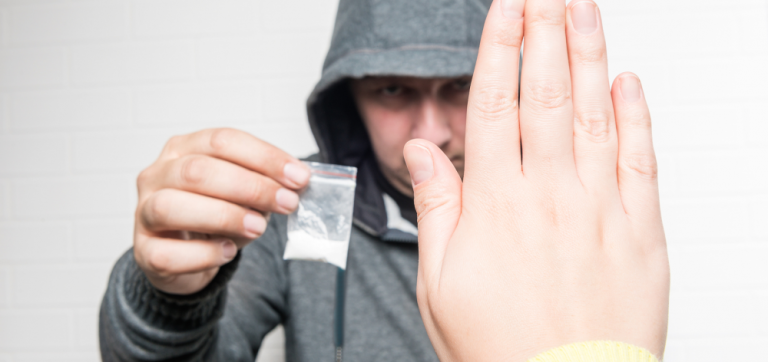According to the World Health Organization (WHO), drugs are any substance that, introduced into the body, interferes with its functioning. Consequently, both cannabis is as drug as aspirin and antibiotic; both alcohol and cocaine; both cigarette and LSD; both coffee and perfume. What varies is how it acts on the body of each individual, as well as the purpose and if it is misused, since when the drug is used for therapeutic purposes, in appropriate doses, it is called medicine.
So every drug is a drug, but not every drug is a drug.
How to identify a user:
"Up close, maybe no one is normal." On the other hand, closely, closely, perhaps the devil is not as ugly as he is painted. “The hard part is looking closely; after all, exclusion hides the unbearable ”.
Well, what do we mean by all this? That before we identify a user, or the drug he may be abusing, it would be essential to understand the human being, how he thinks what he feels, what he wants, what worries him. No hasty judgments, no prejudices, no fear. Easy task? No. Because as Andrade said: "The difficult thing is to look closely ...". Mission Impossible? Neither. We need only be aware that by looking at each other, we are looking at ourselves, at what we most intimately seek to avoid contact with.
The Dependency Reflex:
It's easy to inject heroin, sniff out cocaine, smoke a joint, drink alcohol every time we get upset with others, every time injustices or compromises upset us, every time we have feelings of anguish, so it becomes if a reflex, like the cigarette that some automatically light at all times, to calm your nerves. Dependence on a product almost always arises from the difficulty in coping with the hassles. The need to continue to consume is addiction, which can be psychic or physical.
Psychic dependence: It is within the head that the desire to start over lies. It obliges the individual to consume a product continuously or periodically in order to feel again, or simply as an escape. Physical dependence translates into a state of biological adaptation to drugs that manifest themselves by immense problems when stopping use. Tolerance implies that the individual gets used to the doses. He will then need to increase these doses to achieve the same effect as before with smaller doses. The lethal dose, however, does not rise. By increasing the intake dose, the individual can reach his lethal dose and reach death. Among the risks of drug dependence is overdose.
The issue becomes even more important when the professional drug user can directly affect others, putting their lives at risk.
Drug Prevention:
Prevention of drug misuse It means a pre-intervention, that is, an intervention to be carried out before a certain phenomenon occurs. It is important to emphasize the meaninglessness of drug prevention as drugs are not predictable. Drugs are only natural or synthetic psychoactive substances that can be used by humans for different purposes. We cannot give a particular drug connotations of something good or bad, so they cannot regard a drug itself as destructive or creative. What can be destructive or creative is the way man relates to the drug, regardless of the chemical in question.
Thus, with all these points raised, it is a concern of society through its governments, through its agencies and secretariats, the establishment of drug prevention policies in compliance with the principles of public health.
One of the points of these policies would be the regulated control of abuse through chemical analysis to identify the active ingredients that constitute drugs in samples taken from potential users.
So every drug is a drug, but not every drug is a drug.
How to identify a user:
"Up close, maybe no one is normal." On the other hand, closely, closely, perhaps the devil is not as ugly as he is painted. “The hard part is looking closely; after all, exclusion hides the unbearable ”.
Well, what do we mean by all this? That before we identify a user, or the drug he may be abusing, it would be essential to understand the human being, how he thinks what he feels, what he wants, what worries him. No hasty judgments, no prejudices, no fear. Easy task? No. Because as Andrade said: "The difficult thing is to look closely ...". Mission Impossible? Neither. We need only be aware that by looking at each other, we are looking at ourselves, at what we most intimately seek to avoid contact with.
The Dependency Reflex:
It's easy to inject heroin, sniff out cocaine, smoke a joint, drink alcohol every time we get upset with others, every time injustices or compromises upset us, every time we have feelings of anguish, so it becomes if a reflex, like the cigarette that some automatically light at all times, to calm your nerves. Dependence on a product almost always arises from the difficulty in coping with the hassles. The need to continue to consume is addiction, which can be psychic or physical.
Psychic dependence: It is within the head that the desire to start over lies. It obliges the individual to consume a product continuously or periodically in order to feel again, or simply as an escape. Physical dependence translates into a state of biological adaptation to drugs that manifest themselves by immense problems when stopping use. Tolerance implies that the individual gets used to the doses. He will then need to increase these doses to achieve the same effect as before with smaller doses. The lethal dose, however, does not rise. By increasing the intake dose, the individual can reach his lethal dose and reach death. Among the risks of drug dependence is overdose.
The issue becomes even more important when the professional drug user can directly affect others, putting their lives at risk.
Drug Prevention:
Prevention of drug misuse It means a pre-intervention, that is, an intervention to be carried out before a certain phenomenon occurs. It is important to emphasize the meaninglessness of drug prevention as drugs are not predictable. Drugs are only natural or synthetic psychoactive substances that can be used by humans for different purposes. We cannot give a particular drug connotations of something good or bad, so they cannot regard a drug itself as destructive or creative. What can be destructive or creative is the way man relates to the drug, regardless of the chemical in question.
Thus, with all these points raised, it is a concern of society through its governments, through its agencies and secretariats, the establishment of drug prevention policies in compliance with the principles of public health.
One of the points of these policies would be the regulated control of abuse through chemical analysis to identify the active ingredients that constitute drugs in samples taken from potential users.



